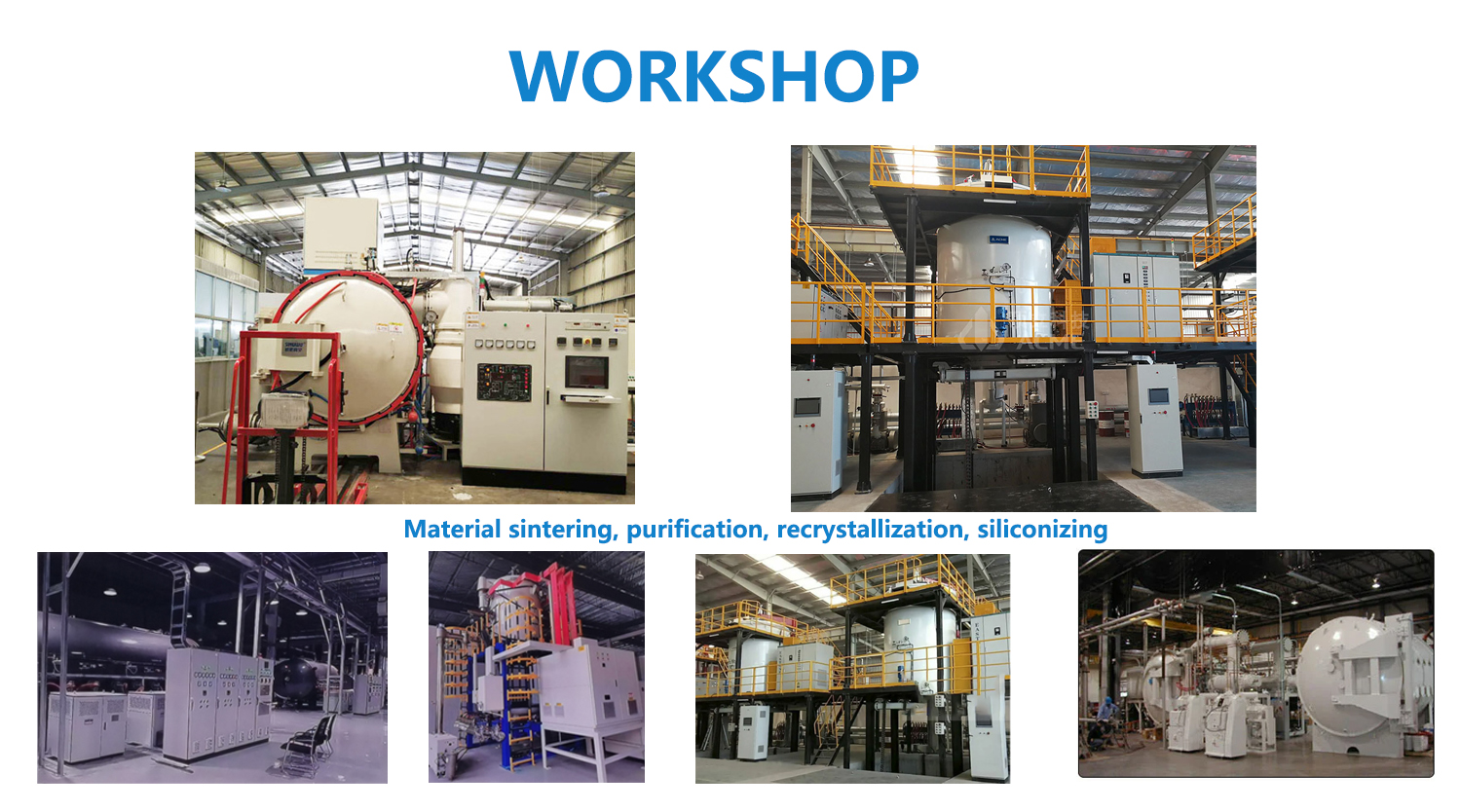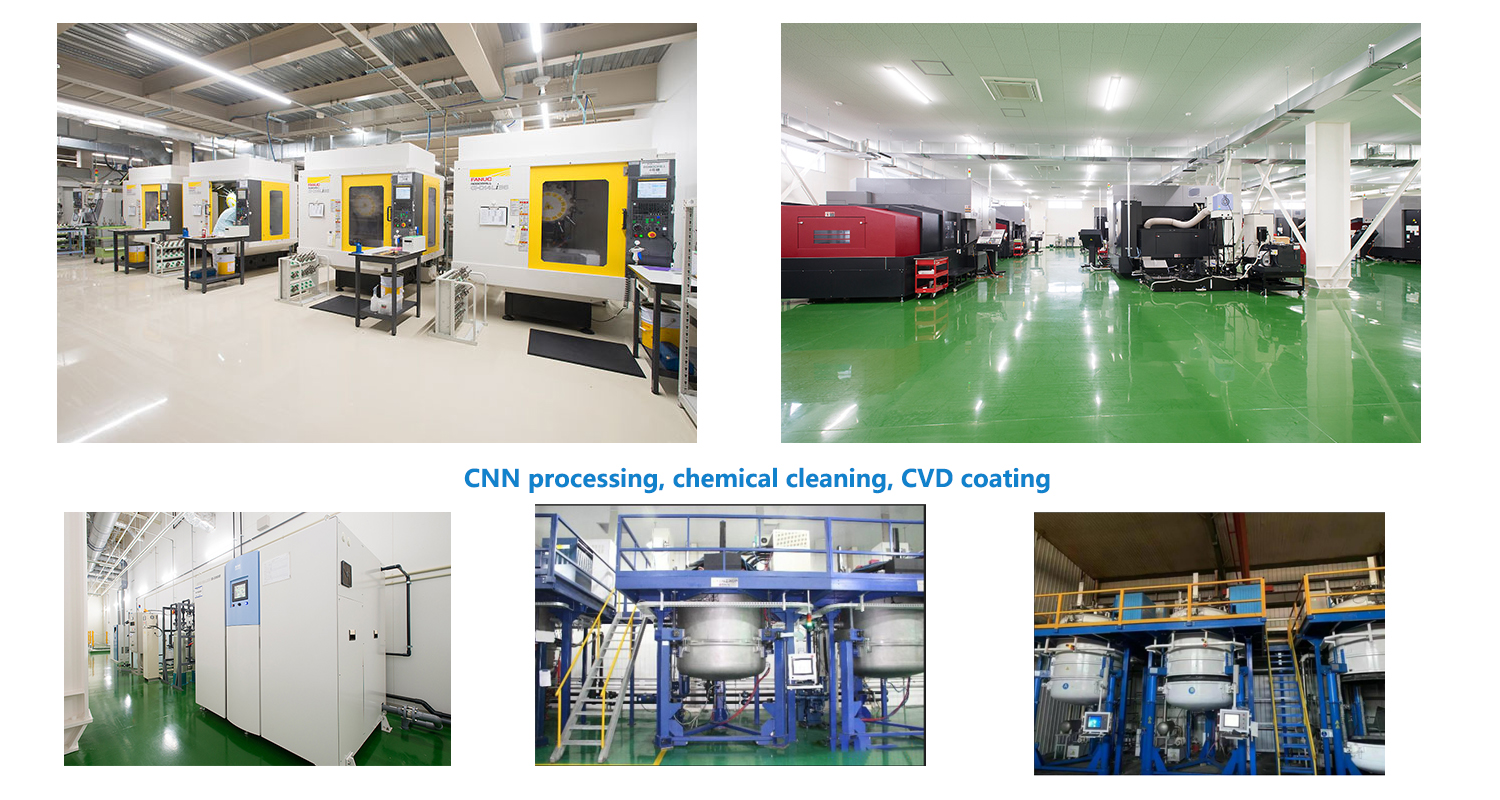
Der Silicon Carbide Dummy Wafer steht als Eckpfeiler bei Halbleitertests und bietet unübertroffene Präzision, Haltbarkeit und Wärmebeständigkeit. Seine fortschrittlichen Eigenschaften richten sich an kritische Herausforderungen in der Industrie, wie die Kosteneffizienz, die Erhaltung der strukturellen Integrität und die Erzielung präziser Messungen. Durch die Verwendung als zuverlässiges Testsubstrat vereinfacht es komplexe Prozesse und verbessert die Genauigkeit der Halbleiterfertigung. Diese Innovation hält nicht nur extremen Bedingungen stand, sondern unterstützt auch die Entwicklung moderner elektronischer Bauteile, was sie für die moderne Fertigung unverzichtbar macht.
Wichtigste Erkenntnisse
- Siliconcarbid-Dummy-Wafer sind kostengünstige Alternativen zu herkömmlichen Silizium-Wafern, reduzieren Materialverschwendung und Betriebskosten in der Halbleiterprüfung.
Ihre außergewöhnliche Haltbarkeit lässt sie standhalten extreme temperatures und mechanische belastung, die minimierung des bedarfs an häufigen austauschen und die verbesserung der workflow-effizienz.
- Diese Wafer sorgen für hohe Präzision und Zuverlässigkeit bei der Prüfung und bieten gleichbleibende Leistung, die zu genauen Messungen und hochwertigen Halbleiterbauelementen führt.
Silikoncarbid-Dummy-Wafer unterstützen verschiedene Anwendungen, von der Qualitätssicherung bis hochtemperaturverarbeitung, so dass sie vielseitige werkzeuge in der halbleiterfertigung.
- Durch die Annahme von Siliziumkarbid-Dummy-Wafern können Hersteller langfristige Kosteneinsparungen erzielen und die Gesamtproduktionseffizienz verbessern, Innovationen in der Elektronikindustrie vorantreiben.
- Ihre Fähigkeit, extreme Bedingungen zu handhaben, macht Siliziumkarbid-Dummy-Wafer unerlässlich, um fortschrittliche Materialien und Technologien zu testen, wie sie in 5G-Netzwerken und Elektrofahrzeugen verwendet werden.
Überblick über Halbleiter Testing Challenges

Halbleitertests spielen eine entscheidende Rolle bei der Leistungsfähigkeit und Zuverlässigkeit elektronischer Bauteile. Dieser Prozess stellt jedoch mehrere Herausforderungen dar, die Hersteller ansprechen müssen, um Effizienz und Qualität zu erhalten.
Hohe Testkosten
Durch die Prüfung von Halbleiterscheiben entstehen oft erhebliche Kosten durch den Einsatz von produktionsfähigen Materialien. Regelmäßige Siliziumwafer, die üblicherweise in der Herstellung verwendet werden, sind kostspielig und anfällig für Schäden während der Prüfung. Die Wiederholung dieser Wafer erhöht die Betriebskosten, insbesondere wenn Fehler oder Fehler auftreten. Hersteller benötigen eine kostengünstige Alternative, um finanzielle Verluste zu minimieren, ohne die Prüfgenauigkeit zu beeinträchtigen.
Silikoncarbid-Dummy-Wafer bieten eine Lösung, indem sie als Prüf- und Kalibrierwerkzeuge dienen. Diese Wafer eliminieren die Notwendigkeit, produktionsfähige Siliziumwafer zu riskieren, Materialverschwendung und Gesamtkosten zu reduzieren. Ihre Haltbarkeit sorgt für wiederholten Gebrauch und trägt im Laufe der Zeit zu Kosteneinsparungen bei.
Langlebigkeitsfragen
Langlebigkeit bleibt ein großes Anliegen bei der Halbleiterprüfung. Regelmäßige Siliziumwafer stoßen häufig nicht auf die extremen Bedingungen, wie hohe Temperaturen und mechanische Belastungen. Dieser Mangel an Widerstand führt zu häufigen Ersetzungen, zu Störungen der Arbeitsabläufe und zu steigender Ausfallzeit.
Silikoncarbid-Dummy-Wafer behandeln dieses Problem mit ihrer außergewöhnlichen Haltbarkeit. Ihre hohe Wärmeleitfähigkeit und Beständigkeit gegen extreme Bedingungen machen sie ideal für strenge Prüfumgebungen. Durch die dauerhaften harten Prozesse ohne Abbau verbessern diese Wafer die Betriebseffizienz und reduzieren Unterbrechungen.
Präzision und Zuverlässigkeit
Präzision und Zuverlässigkeit zu erreichen, ist bei der Halbleiterprüfung unerlässlich. Regelmäßige Siliziumwafer können aufgrund ihrer geringen strukturellen Integrität unter anspruchsvollen Bedingungen Unstimmigkeiten einführen. Diese Inkonsistenzen können die Genauigkeit der Messungen und die Zuverlässigkeit der Testergebnisse beeinträchtigen.
Silikoncarbid-Dummy-Wafer zeichnen sich durch Präzision und Zuverlässigkeit aus. Ihre überlegene strukturelle Integrität gewährleistet eine gleichbleibende Leistung auch unter Hochdruckszenarien. Diese Konsistenz ermöglicht es den Herstellern, genaue Daten zu erhalten, was die Entwicklung hochwertiger Halbleiterbauelemente ermöglicht.
Was sind Silikon Carbide Dummy Wafers?
Silikoncarbid-Dummy-Wafer sind spezialisierte Werkzeuge für die Halbleiterprüfung und Herstellung. Diese aus Siliziumkarbid gefertigten Wafer dienen während der Entwicklungs- und Prüfphasen von Halbleiterbauelementen als nicht-funktionelle Substrate. Ihre einzigartigen Eigenschaften machen sie unverzichtbar, um die Effizienz und Genauigkeit der Prüfprozesse zu gewährleisten.
Zusammensetzung und Eigenschaften
Siliziumkarbid-Dummy-Wafer bestehen aus Siliziumkarbid, einer für seine außergewöhnlichen Materialeigenschaften bekannten Verbindung. Diese Verbindung zeigt einen größeren Bandgap im Vergleich zu Silizium, was seine Funktionsfähigkeit bei hohen Temperaturen und Spannungen erhöht. Darüber hinaus bietet Siliziumkarbid eine überlegene Wärmeleitfähigkeit, so dass Geräte die Leistung auch bei extremen Bedingungen zu halten.
Die strukturelle Integrität dieser Wafer sorgt für Widerstand gegen mechanische Beanspruchung und macht sie ideal für strenge Prüfumgebungen. Ihre hohe dielektrische Ausfallfestigkeit und geringe spezifische Widerstandsfähigkeit tragen weiter zu ihrer Zuverlässigkeit in der Leistungselektronik bei. Diese Eigenschaften ermöglichen es Siliziumkarbid-Dummywafer, den Anforderungen moderner Halbleiterherstellungsprozesse standzuhalten.
Zweck in Semiconductor Prüfung
Siliziumkarbid-Dummy-Wafer spielen bei der Halbleiterprüfung eine entscheidende Rolle, indem sie als zuverlässige Testsubstrate wirken. Hersteller verwenden diese Wafer, um reale Produktionsbedingungen zu simulieren, ohne dass funktionelle Siliziumwafer beschädigt werden. Dieser Ansatz minimiert die Materialverschwendung und senkt die mit Prüffehlern verbundenen Kosten.
Bei der Hochtemperaturverarbeitung bieten diese Wafer eine stabile Plattform zur Bewertung neuer Materialien und Technologien. So unterstützen sie die Prüfung von fortschrittlichen Materialien wie Galliumoxid und Aluminiumnitrid, die für elektronische Komponenten der nächsten Generation unerlässlich sind. Ihre Präzision und Haltbarkeit sorgen für genaue Messungen von Parametern wie Foliendicke und Druckbeständigkeit und tragen zur Validierung von Produktionsprozessen bei.
Darüber hinaus sind Siliziumkarbid-Dummy-Wafer in der Qualitätssicherung instrumental. Sie ermöglichen es den Herstellern, Fehler zu erkennen, Mustergrößen zu messen und geometrische Genauigkeit bei der Lithographie zu gewährleisten. Durch die Aufrechterhaltung der Konsistenz und Zuverlässigkeit helfen diese Wafer, die Halbleiterfertigung zu optimieren und die Gesamtproduktionseffizienz zu verbessern.
Wie Silikon Carbide Dummy Wafers Adresse Testing Challenges
Verbesserte Haltbarkeit
Die Langlebigkeit spielt eine zentrale Rolle bei der Halbleiterprüfung, bei der Materialien extreme Bedingungen ertragen müssen, ohne die Leistung zu beeinträchtigen. Siliziumkarbid-Dummywafer zeichnen sich in diesem Aspekt durch ihre außergewöhnliche Wärmeleitfähigkeit und mechanische Festigkeit aus. Im Gegensatz zu normalen Siliziumwafern halten diese Wafer hohen Temperaturen und mechanischen Belastungen stand und gewährleisten eine gleichbleibende Leistung bei strengen Prüfverfahren.
Die strukturelle Integrität von Siliziumcarbid-Dummy-Wafern minimiert das Risiko von Beschädigungen, auch unter längerem Gebrauch. Diese Widerstandsfähigkeit reduziert die Häufigkeit der Ersatzarbeiten, so dass Hersteller ununterbrochene Workflows beibehalten können. Diese Wafer verbessern die Zuverlässigkeit von Prüfumgebungen und tragen zur Langlebigkeit von Halbleiterfertigungswerkzeugen bei.
"Wide-Bandgap-Materialien wie Siliziumkarbid haben in der Leistungselektronik durch ihre überlegenen elektrischen Eigenschaften an Bedeutung gewonnen." Diese Aussage unterstreicht die Fähigkeit des Materials, anspruchsvolle Bedingungen zu ertragen, so dass es eine ideale Wahl für Testanwendungen.
Kostensenkung
Die hohen Kosten im Zusammenhang mit Halbleitertests stammen oft aus der Verwendung von produktionsfähigen Siliziumwafern, die sowohl teuer als auch schädigend sind. Siliconcarbid-Dummy-Wafer bieten eine kostengünstige Alternative, indem sie als wiederverwendbare Testsubstrate dienen. Ihre Langlebigkeit sorgt für mehrere Zyklen der Verwendung, erheblich reduzieren Materialverschwendung und Betriebskosten.
Die Hersteller profitieren von der langfristigen Kostenersparnis dieser Wafer. Durch die Minimierung des Bedarfs an häufigen Ersetzungen senken Siliciumcarbid-Dummy-Wafer die Gesamttestkosten unter Beibehaltung von Genauigkeit und Effizienz. Diese Kostensenkung erweist sich besonders in großen Produktionsumgebungen, in denen die Prüfung einen wesentlichen Teil der Betriebsbudgets darstellt.
Zusätzlich unterstützt die Vielseitigkeit von Siliziumkarbid-Dummywafern verschiedene Anwendungen, von der Qualitätssicherung bis zur Hochtemperaturverarbeitung. Diese Anpassungsfähigkeit erhöht ihren Wert weiter und ermöglicht es den Herstellern, ihre Testprozesse zu optimieren, ohne zusätzliche Kosten zu verursachen.
Verbesserte Genauigkeit und Zuverlässigkeit
Präzision und Zuverlässigkeit sind kritisch bei der Halbleiterprüfung, bei der auch kleinere Inkonsistenzen die Qualität elektronischer Bauteile beeinträchtigen können. Siliconcarbid-Dummy-Wafer behandeln diese Herausforderungen, indem sie eine stabile und konsistente Plattform für Tests bieten. Ihre überlegene strukturelle Integrität sorgt für genaue Messungen, auch unter Hochdruckszenarien.
Diese Wafer spielen eine entscheidende Rolle bei der Validierung von Produktionsprozessen, indem präzise Auswertungen von Parametern wie Foliendicke und Druckfestigkeit ermöglicht werden. Ihre hohe thermische Stabilität und geringe spezifische Widerstandsfähigkeit tragen zu einer gleichbleibenden Leistung bei und sorgen für zuverlässige Testergebnisse über verschiedene Bedingungen.
In der Lithographie dienen Siliziumkarbid-Dummywafer als Benchmarks zur Erkennung von Defekten und Messmustergrößen. Ihre Präzision unterstützt die Entwicklung fortschrittlicher Halbleiterbauelemente, bei denen die geometrische Genauigkeit wesentlich ist. Durch die Verbesserung der Genauigkeit und Zuverlässigkeit optimieren diese Wafer Prüfprozesse und verbessern die Gesamtqualität der Halbleiterfertigung.
Vorteile der Verwendung von Silikon Carbide Dummy Wafers

Long-Term Cost Savings
Siliconcarbid-Dummy-Wafer bieten erhebliche finanzielle Vorteile für Halbleiterhersteller. Ihre Haltbarkeit ermöglicht wiederholten Gebrauch und reduziert den Bedarf an häufigen Ersatz. Im Gegensatz zu normalen Siliziumwafern, die unter extremen Prüfbedingungen oft abbauen, halten diese Wafer ihre strukturelle Integrität im Laufe der Zeit. Diese Langlebigkeit minimiert Materialverschwendung und Betriebskosten.
Die hohe Wärmeleitfähigkeit und mechanische Festigkeit von Siliziumkarbid-Dummywafern sorgen für eine gleichbleibende Leistung bei strengen Tests. Hersteller profitieren von geringeren Kosten, die mit Fehlern und Defekten verbunden sind, da diese Wafer die Präzision bei Prüfprozessen beibehalten. Durch die Investition in Siliziumkarbid-Dummy-Wafer erzielen Unternehmen erhebliche Kosteneinsparungen, insbesondere in großflächigen Produktionsumgebungen, in denen die Prüfung einen großen Aufwand darstellt.
Branchenexperten betonen, dass "Automatisierung und innovative Technologien helfen, Kosten zu reduzieren und die Effizienz zu verbessern" bei der Herstellung von Siliziumkarbid-Dummy-Wafern. Diese Fortschritte verbessern die Erreichbarkeit und Zugänglichkeit der Hersteller.
Erhöhung der Zuverlässigkeit
Die Zuverlässigkeit bleibt ein kritischer Faktor bei der Halbleiterprüfung, und Siliziumkarbid-Dummywafer zeichnen sich in diesem Bereich aus. Ihre überlegene strukturelle Integrität gewährleistet eine gleichbleibende Leistung auch unter Hochdruckszenarien. Diese Konsistenz ermöglicht es den Herstellern, genaue Daten zu erhalten, die für die Entwicklung hochwertiger Halbleiterbauelemente unerlässlich sind.
Die Fähigkeit dieser Wafer, extremen Temperaturen und mechanischen Belastungen standzuhalten, macht sie für die fortschrittliche Chipproduktion unverzichtbar. Ihre hohe dielektrische Ausfallfestigkeit und geringe spezifische Widerstandsfähigkeit tragen zu zuverlässigen Testergebnissen bei. Durch die Verwendung von Siliziumkarbid-Dummy-Wafern können Hersteller zuversichtlich Produktionsprozesse validieren und die Qualität ihrer Produkte gewährleisten.
According to Branchenexperten"Siliziumcarbid-Dummy-Wafer spielen eine entscheidende Rolle bei der Prüfung und Validierung von Fertigungsanlagen." Ihre Zuverlässigkeit unterstützt die Entwicklung moderner Technologien, darunter 5G-Netze und Elektrofahrzeuge.
Größere Effizienz
Die Effizienz bei Halbleitertests wirkt direkt auf Produktionszeitlinien und Gesamtproduktivität. Siliconcarbid-Dummy-Wafer optimieren Testprozesse durch eine stabile und konsistente Plattform. Ihre Präzision reduziert die Fehlerwahrscheinlichkeit und ermöglicht schnellere Auswertungen von Parametern wie Foliendicke und Druckfestigkeit.
Diese Wafer unterstützen auch die Hochtemperatur-Verarbeitung, die für die Prüfung fortschrittlicher Materialien wie Galliumoxid und Aluminiumnitrid unerlässlich ist. Ihre Leistungsfähigkeit unter extremen Bedingungen erhöht die Effizienz der Prüf- und Kalibrierverfahren. Dadurch können die Hersteller ihre Workflows optimieren und die Entwicklung von elektronischen Komponenten der nächsten Generation beschleunigen.
Die Vielseitigkeit von Siliziumkarbid-Dummywafern trägt weiter zu ihrer Effizienz bei. Sie passen sich an verschiedene Anwendungen an, von der Qualitätssicherung bis zur Lithographie, um eine nahtlose Integration in verschiedene Stufen der Halbleiterfertigung zu gewährleisten. Diese Anpassungsfähigkeit ermöglicht es den Herstellern, ihre Ressourcen zu maximieren und eine höhere Produktivität zu erreichen.
Branchenexperten betont, dass "die anwendungen von siliziumcarbid-dummy-wafern mehrere branchen überspannen", betont ihre rolle bei der verbesserung der effizienz in sektoren wie erneuerbare energie und automotive.
Siliconcarbid-Dummy-Wafer haben Halbleitertests revolutioniert, indem kritische Herausforderungen wie hohe Kosten, Haltbarkeitsprobleme und Präzisionsbedenken angesprochen werden. Ihre fortschrittlichen Eigenschaften, einschließlich außergewöhnlicher thermischer Stabilität und struktureller Integrität, machen sie für die moderne Fertigung unverzichtbar. Diese Wafer optimieren Testprozesse, reduzieren Materialverschwendung und gewährleisten zuverlässige Ergebnisse und ermöglichen es Herstellern, kostengünstige und effiziente Operationen zu erreichen.
Durch die Annahme von Siliziumkarbid-Dummy-Wafern können Industrien die Qualität von Halbleiter-Geräten verbessern und Innovationen in High-Power- und Hochfrequenz-Anwendungen treiben. Ihre Rolle bei der Weiterentwicklung der Technologie unterstreicht ihre Bedeutung bei der Gestaltung der Zukunft der Elektronik.
FAQ
Was sind Siliziumkarbid-Dummywafer?
Siliziumkarbid-Dummy-Wafer, oft als SiC Dummy Wafers bezeichnet, sind nicht-funktionale Wafer aus Siliziumkarbid gefertigt. Diese Wafer spielen bei der Halbleiterherstellung eine entscheidende Rolle, indem sie während der Entwicklungs- und Testphasen von Halbleiterbauelementen als Testsubstrate dienen. Ihre einzigartigen Eigenschaften, wie hohe Wärmeleitfähigkeit und außergewöhnliche Haltbarkeit, machen sie ideal für die Bewertung neuer Fertigungsprozesse und Materialien. Silicon carbide dummy wafers gewährleistung der eignung für hochleistungs-, hochfrequenz- und hochtemperaturanwendungen.
Warum sind Siliziumkarbid-Dummy-Wafer wichtig bei der Halbleiterprüfung?
Siliconcarbid-Dummy-Wafer vereinfachen die Halbleiterprüfung durch die Bereitstellung einer zuverlässigen Plattform zur Auswertung von Produktionsprozessen. Sie reduzieren das Risiko, funktionelle Siliziumwafer während der Prüfung zu schädigen, wodurch Kosteneffizienz und Materialkonservierung gewährleistet werden. Ihre Fähigkeit, extremen Bedingungen, wie hohen Temperaturen und mechanischen Belastungen zu widerstehen, sorgt für gleichbleibende Leistung und genaue Testergebnisse. Diese Zuverlässigkeit macht sie unverzichtbar, um Qualität und Präzision in der Halbleiterfertigung zu erhalten.
Was sind die Anwendungen von Siliziumkarbid-Dummywafern?
Siliconcarbid-Dummy-Wafer finden Anwendungen auf verschiedenen Stufen der Halbleiterfertigung. Sie fungieren als Prüf- und Kalibrierwerkzeuge, um die Präzision und Qualität der Produktionsausrüstung zu gewährleisten, ohne dass tatsächliche Produktionswafer beschädigt werden. Industrien wie Erneuerbare Energien und Automotive nutzen diese Wafer auch zum Testen fortschrittlicher Technologien, einschließlich Solarzellen und Leistungselektronik. Ihre Vielseitigkeit erstreckt sich auf Hochtemperaturverarbeitung, Lithographie und Qualitätssicherung.
Wie tragen Siliziumkarbid-Dummywafer zu Kosteneinsparungen bei?
Siliziumkarbid-Dämtchen reduzieren die Kosten bei der Halbleiterprüfung deutlich. Ihre Haltbarkeit ermöglicht wiederholten Gebrauch und minimiert den Bedarf an häufigen Ersatz. Durch die Verwendung als wiederverwendbare Prüfsubstrate senken sie die Materialverschwendung und die Betriebskosten. Die Hersteller profitieren von langfristigen Kosteneinsparungen, vor allem in großen Produktionsumgebungen, in denen die Prüfung einen wesentlichen Teil des Budgets darstellt.
Können Siliziumkarbid-Dummy-Wafer extreme Bedingungen behandeln?
Ja, Siliziumkarbid-Dummy-Wafer zeichnen sich durch extreme Bedingungen aus. Ihre hohe Wärmeleitfähigkeit und mechanische Festigkeit ermöglichen es, hohe Temperaturen und mechanische Belastungen ohne Abbau zu erhalten. Diese Eigenschaften machen sie geeignet für strenge Prüfumgebungen, die eine gleichbleibende Leistung und Zuverlässigkeit auch unter anspruchsvollen Szenarien gewährleisten.
Was macht Siliziumkarbid zu einem bevorzugten Material für Blindwafer?
Siliziumkarbid zeichnet sich durch seine außergewöhnlichen Materialeigenschaften aus. Es bietet eine größere Bandgap im Vergleich zu Silizium, erhöht seine Fähigkeit, unter hohen Temperaturen und Spannungen zu arbeiten. Seine überlegene Wärmeleitfähigkeit und strukturelle Integrität gewährleisten Haltbarkeit und Präzision bei Prüfprozessen. Diese Eigenschaften machen Siliziumkarbid eine ideale wahl für dummy wafer in fortschrittlicher halbleiterfertigung.
Wie verbessern Siliziumkarbid-Dummywafer die Prüfgenauigkeit?
Silikoncarbid-Dummy-Wafer verbessern die Prüfgenauigkeit durch die Bereitstellung einer stabilen und konsistenten Plattform für Auswertungen. Ihre überlegene strukturelle Integrität sorgt für präzise Messungen von Parametern wie Foliendicke und Druckfestigkeit. Diese Konsistenz ermöglicht es den Herstellern, zuverlässige Daten zu erhalten, was die Entwicklung hochwertiger Halbleiterbauelemente ermöglicht.
Sind Siliziumkarbid-Dummywafer umweltfreundlich?
Siliziumkarbid-Dummy-Wafer tragen zur ökologischen Nachhaltigkeit bei, indem Materialverschwendung bei Halbleitertests reduziert wird. Ihre Haltbarkeit und Wiederverwendbarkeit minimieren den Bedarf an häufigen Austauschen und senken den Rohstoffverbrauch. Diese Effizienz richtet sich an die Bemühungen der Industrie, umweltfreundliche Praktiken in der Fertigung zu verabschieden.
Welche Branchen profitieren von Siliziumkarbid-Dummywafern?
Mehrere Branchen profitieren von der Verwendung von Siliziumkarbid-Dummywafern. Die Halbleiterindustrie setzt auf diese Wafer zur Prüfung und Qualitätssicherung. Erneuerbare Energiesektoren nutzen sie bei der Entwicklung von Solarzellen, während die Automobilindustrie sie bei der Prüfung von Leistungselektronik für Elektrofahrzeuge einsetzt. Ihre Vielseitigkeit unterstützt Fortschritte in High-Power- und Hochfrequenzanwendungen auf mehreren Feldern.
Wie unterstützen Siliziumkarbid-Dummywafer Innovation?
Siliziumkarbid-Dummy-Wafer spielen eine entscheidende Rolle bei der Innovation in der Halbleiterindustrie. Sie bieten eine zuverlässige Plattform zum Testen von entstehenden Materialien wie Galliumoxid und Aluminiumnitrid. Diese Materialien sind für Technologien der nächsten Generation unerlässlich, darunter 5G-Netzwerke und leistungsstarke elektronische Geräte. Durch präzise Auswertungen unterstützen Siliziumkarbid-Dummywafer die Entwicklung moderner Lösungen, die die Zukunft der Elektronik prägen.